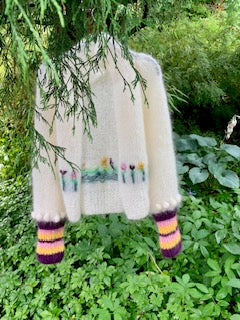

Which stitches for what and how
-

Sometimes it can be difficult to know which stitch goes with what. Below you will find illustrations and instructions for the different stitches and flower embroidery. The page is updated regularly 🤎
Good luck!
Part 1 - Stitching and sewing illustrations.
Loop stitching, flower stitches, French knots, chain stitch, silk stitch, long stitch, cross stitch, flat stitch, backstitch, double backstitch, shadow stitch,
Part 2 - Various flower embroideries.
Balderbloom, Red clover, Bluebell, Priest's collar, Red John's wort, Whiteweed
Part 1. Stitching & sewing illustrations ▶
Swipe left-

Loop stitch
Loop stitch - this is the perfect stitch for embroidering small leaves, and small fine details. Stick the needle up where you want the stitch to start, and place the thread in a loop as large as desired. Then insert the needle back down at the stitch, and thread the needle back up on the other side. Pass a small stitch over the loop to hold it in place.
-

The flower stitch
Flower stitch - The loop stitch is the perfect flower string. This illustration shows how the stitch is used to create a simple flower.
-

French knots - version 1.
French knots - twist the thread many times around the needle. Be sure to keep the thread taut, and insert the tip of the needle back down near the stitch. The more times you thread around the needle, the bigger the knot will be. French knots fit nicely as, for example, stamens in flower embroideries.
-

French knot - version 2.
To make a French knot, wrap the thread around the needle while keeping the thread taut and insert the needle near the stitch. The more times the thread is wrapped around the needle, the larger the knot will be. The stitches are embroidered individually or in groups.
-

Chain stitch
Chain stitch - consists of small loops, which on the right side form a chain. The needle is inserted at the top point, and the thread is placed in a loop to the left. The needle is then inserted down to the point of the needle and up and a little further down, with the thread under the needle tip. This stitch is perfect for e.g. embroidering flower stems.
-

Security
Silk stitches - are stitches that are embroidered at an angle. The stitches can optionally be embroidered to the right or left, or both sides. The needle is inserted into the knit, and as far as you want the stitch length, the needle is then inserted back up until the previous stitch. This stitch is often used for contour stitching.
-

Long seam
Longitudinal stitch - always embroidered to the right. The thread is placed under the needle point. The stitches can be of different lengths, and placed at different densities or in groups. Often used for edge stitching, buttonholes and for attaching appliqués.
-

Cross Council
The cross stitch is embroidered in two steps. First a right-handed stitch, and then a left-handed stitch. The stitch then forms a cross or cross on the right side with a vertical stitch on the wrong side. The superimposed stitches must go in the same direction. Embroider one cross stitch at a time or embroider first a series of half cross stitches and then a crossing stitch to make the stitches whole.
-

Flat stitch
Flat stitches can be embroidered one-sided or two-sided. A two-sided flat stitch looks the same on both the right and wrong sides. A one-sided stitch is embroidered with only the outline so that only the small stitches are visible on the wrong side.
-

Attersting
A backstitch is a smooth diagonal stitch. The stitches are often used to embroider outlines and small details, and are often embroidered as a straight line above or next to already embroidered stitches. When embroidering a backstitch, the needle is inserted behind where the needle was last inserted, and the needle is then inserted at the same distance in front of the previous backstitch. The backstitch should be embroidered last of all the stitches.
-

Double backstitching
Double backstitches are embroidered towards you, two steps forward and one back. The needle is inserted close to the previous stitch and then a stitch twice as long is made forward.
-

Shadow stitch
Shaded stitches consist of more or less closely spaced stitches of varying lengths. They are often used to fill larger areas, and are perfect for, for example, floral embroidery.
Part 2. Various flower embroideries ▶
Swipe left-

Balderblom
This yellow buttock flower is embroidered with simple loop stitches. Here, it has been chosen to keep the center of the flower open to give a more airy expression.
-

Red clover
This red clover is embroidered with chain stitch in different shades of pink to create play in the flower. The flower is embroidered from top to bottom, so that the stitches are placed over each other.
-

Bluebell
This blue bell is made using loop stitches in various lengths. The bluebell here has also been given a leaf at the bottom.
-

Priest collar
To create this priest's collar, white silk embroidery thread was used, in combination with mohair thread. The dust carriers are made with French knots and mohair yarn and loop stitches.
-

Red St John's Wort
This one is made with loop stitches in pink mohair, and with several white stamens in the middle, embroidered with French knots. This one is embroidered with small leaves at the bottom, embroidered with chain stitches in green in variegated mohair from Bella by Permin.
-

White road
This Hvitveisen is embroidered with loop stitch, in a combination of white mohair and gold thread. The stamens are embroidered with French knots in gold.
Please contact us for collaboration 🤍
Feel free to follow me on social media 🖤


















